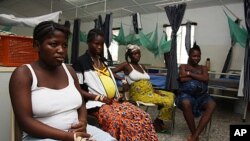Amnesty International says pregnant women in Sierra Leone are being denied medical care and forced to pay for medicines despite a nationwide free healthcare initiative launched last year.
In April 2010, Sierra Leone launched a $90 million free healthcare program that eliminates fees for pregnant and breastfeeding women at government-run health centers.
Sierra Leone is one of the most dangerous places to give birth in the world. The government says the promise of free treatment has gotten record numbers of pregnant women into health centers for pre-natal visits and deliveries.
However, Amnesty International said Tuesday that health facilities are either running out of medicines or are forcing women to buy essential drugs that should be free and then turning away those who cannot pay.
Amnesty International's Health Policy Coordinator, Rajat Khosla, said corruption and poor monitoring are to blame.
"Drugs and medical supplies are leaking out of the healthcare system and are rerouted as drugs for sale. And second [for] the procurement and management of drugs, the system that has been put in place, is complex and very poorly managed," said Khosla. "The dysfunctionality of the health system in many ways with regards to monitoring and accountability has created a permissive environment for bad practices and corruption. Even when they are detected, there is hardly any punishment meted out."
Amnesty says corruption and delays at the port in Freetown continue to interrupt the drug supply, while poor record keeping and inventory management in health centers make it difficult to track supplies and hold staff accountable.
Amnesty says women who are denied access to treatment have no way to complain.
Khosla said some women told Amnesty they were so frustrated that they will no longer go back to a health center, even if they experience complications during childbirth.
"Unless the government takes measures to strengthen the system, there is a risk of backsliding from the gains that have been made in the last year and a half with the free health care policy," said Khosla.
In July, Sierra Leonean president, Ernest Bai Koroma, called for a crackdown on criminality within the Free Health Care Initiative.
Amnesty says the government has taken certain corrective measures, including increasing health worker's salaries and providing them with training, but more work must be done to bolster accountability and improve healthcare, particularly in rural areas.
Sierra Leonean Women Face Hurdles in Access to Care









